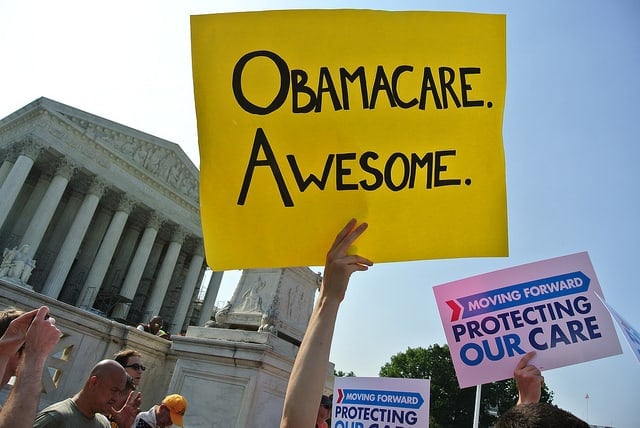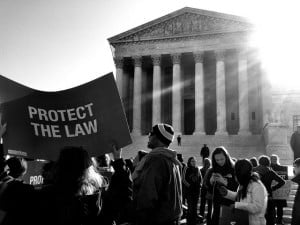Today, June 25, 2015, the Supreme Court, in the case of King v. Burwell, upheld insurance subsidies intended to ensure all Americans have access to affordable health care. The opinion, written by Chief Justice John Roberts and joined in fully by Justices Breyer, Ginsburg, Kagan, Kennedy, and Sotomayor, is mercifully brief and about as readable as one of these opinions can be.1 Many will cast this as a victory for President Obama and his signature domestic achievement. Others will bemoan it for more or less the same reason.
But this case was far more important than whether it was President Obama or the GOP vindicated. It was about much more than just who won or who lost. It was, rather, about whether and how we choose to improve the lot of those who are worse off in this world, about whether and how we choose to sacrifice for the common good, about whether and how we reconcile personal ideological obsessions with the requirements of a just moral order. Or, as Ezra Klein wrote in Vox.com,
“This wasn’t a ‘win for Obamacare’ … This was a win for the more than 6 million people who will keep their health insurance. It’s a win for parents who can be sure their children can go to the doctor, and for minimum-wage workers who can call an ambulance without worrying about debt. Basic health security for millions of people was on the line in this decision. Everything else was secondary to that.”
As much as it pains me to say, it is rare that a Supreme Court decision actually has that much on the line.2
At some level, the entire challenge seems a bit surreal. The plaintiffs had ideological objections to “Obamacare” and wanted to find a way to undermine it, so they decided to challenge it in court. Given that the Supreme Court had already upheld the law in general, they had to find a weak point within the law. Thus, the challenge to the subsidy regime. In order to get into court, though, they needed some injury to themselves, not just an abstract objection. So, they sued over the fact that they were receiving subsidies in the first place. That is, they were basically suing because the government was helping them acquire health insurance. It is rare that we encounter someone who sues in order to not get money. But, these plaintiffs realized that, without subsidies, the Act would be seriously undermined. So, let’s take a step back and see what was actually going on.
The Affordable Care Act (ACA) has the goal of expanding access to health insurance. It does this through three major reforms: it requires insurers to issue insurance without taking into account an individual’s pre-existing conditions (guaranteed issue); it requires individuals to obtain and maintain health insurance or pay a tax penalty (individual mandate); and it requires the Federal Government give tax credits to individuals to make insurance affordable (subsidy). Arising out of these major components is a whole infrastructure of reform designed to complement the goal of universal or near-universal coverage, as well as rules guaranteeing certain minimum requirements for such insurance.
It was this complementary infrastructure that was the basis of the plaintiff’s challenge in King. The law required that each state have an “Exchange” — basically an online marketplace for individuals to shop for insurance. The hope was that each State would operate its own Exchange, but the law provided that the federal government could operate an Exchange in states that did not set up their own. Just under half the states set-up their own exchanges – all fine so far.
The challenge emerged when looking at one of part of the subsidy statute, which refers to “an Exchange established by the State.” King and his fellow plaintiffs argued that this automatically barred subsidies to any individual where the federal government operated the exchange, rather than the specific state. Virginia, where they lived, has such a federally-operated exchange. Thus, they believed the federal government could not give them subsidies. Without the subsidies, the cost of health insurance would trigger an exemption to the individual mandate for them.3 Thus, no Obamacare for them! Huzzah!
***
What is lost here, of course, is the reality of millions of individuals who suddenly lose the ability to pay for their insurance. Unlike the abstract objections of Mr. King and his fellow plaintiffs, these were real individuals, with real, concrete illnesses, who had already obtained insurance and who could only pay for it with the assistance of these subsidies. If these subsidies were struck down, the loss of insurance was a very real, and very deadly proposition. The federal government had already admitted it had no real ability to fix this problem. Congressional leaders, likewise, had no plan to offer.
None of this bothered Mr. King, the lead plaintiff. After all, he has his health care available to him from the federal government already. Indeed, Mr. King is a veteran who served during the Vietnam war and so utilizes the Department of Veterans Affairs for his health care needs. And his lawyers have assured him, he told the New York Times, that “things are in play” that would help out everyone else. Yet, as pointed out above, it is not at all clear what “things” could be in play, other than a moral victory for Mr. King and those who share his views.
Let me be clear, you do not have to be a fan of the Act, or of President Obama, or even of federal subsidies for health care, in order to see that this cavalier attitude is disturbing. It is the triumph of radical individualism. It is the defeat for any care or concern for other people. It is the victory of win-at-any-cost political thinking. The plaintiffs and those who supported them would sacrifice access to health insurance, rather than offer a useful alternative. Writing at FoxNews.com, Dr. Sreedhar Potarazu made the point clearly. He objects to the ACA but argues that throwing out the subsidies is simply the wrong way to make things better. He clearly lays out the variety of economic and ethical problems to doing this, with a special focus on the impact on health care providers. He concludes that “[w]e had to maintain the subsidies. Not only was it the compassionate thing to do, but it was also the cheapest. Thursday’s’ Supreme Court decision made things much better for all of us.” All of us are better when those in need have access to reliable health care.
This cavalier attitude reflects a politics of deprivation. It comes down to a sense that when I have mine, I don’t care about you getting yours. It reflects a mentality of intentional disregard. It is, in this sense, no different than those voices calling to limit, restrict, and punish those who receive public assistance, forcing them to conform to our own sense of how the poor should behave. It is the priority of ideology over charity.
Is this Act the best of all possible worlds with regard to providing access to health insurance. Certainly not! It is, however, the only option currently on the table for actually expanding access to health care. There are undoubtedly ways to improve it. Some of those might involve changing or even removing the subsidies. The problem here is not that these challengers wanted subsidies removed, it is that the whole point of their lawsuit has been to gut the law for ideological reasons, ignoring the millions who now depend on it. Indeed, the entire process has been a post-hoc search for a way to sabotage the law, especially once the “main” challenge to the individual mandate failed. The specific arguments presented in King v Burwell were never raised during the drafting of the law (when they would have been quickly and efficiently resolved). During the debates, everybody assumed subsidies would be available in all states and in all exchanges, regardless of whether they were state-operated or federally-operated. The challengers, then, relied upon four words, taken out of context, to invalidate a major component of a massive piece of legislation.
***
Thus, it is no real surprise the a majority of the Court rejected this challenge. Chief Justice Roberts’s opinion takes Congress to task for its inartful drafting.4 He acknowledges that, looking at just the four words the challengers focus on, the subsidies can seem suspect. However, he also acknowledges that laws are complex, with interlocking parts, and seen in context. He refuses to rely simply upon four words, without reference to the entirety of the legislative undertaking at issue.
So, he embarks on a comprehensive review of just what Congress wanted to do. The entirety of the statute was designed to provide health insurance to as many Americans as possible. He goes through the text of the statute to make it clear that federal exchanges are functionally equivalent to state-operated exchanges. He relies on the definitions Congress puts in the law. He points out that if the challenger’s views prevailed, then it would logically apply to most of the ACA as well, and almost no rules would apply to the federally-operated exchanges; this would be an absurd result. Moreover, many other provisions assume tax credits will be available on exchanges regardless of who operates them. (Roberts specifically cites the requirement that the exchanges all distribute information about subsidies and provide an electronic calculator to help determine the cost and amount of subsidy). Fundamentally, he relies upon the overall structure of the act — not just four words in one section. Without subsidies available to all who qualify, the ACA would collapse in a “death spiral” and the whole purpose of the act would be frustrated.5ithout the federal subsidies … the exchanges would not operate as Congress intended and may not operate at all.” 567 U.S. ___, ___ (2012) (Scalia, Kennedy, Thomas, Alito, JJ., dissenting)] This cannot be the case. “It would be implausible that Congress meant the Act to operate in this manner.” (King, slip op. at 17).
Ultimately, his point is clear — the law does what the law says it does. A court will not interpret a law in such a way that the fundamental way the law functions is undermined. His opinion is devoid of partisan rhetoric, or even any evaluation of the law as good or bad policy. Rather, he refuses to gut a law on semantics. He looks to the law as a whole. He reviews the reasons for the law. He sees how the law is intended to operate. And he throws the challengers to the curb. His conclusion is crisp and clear: “A fair reading of legislation demands a fair understanding of the legislative plan. Congress passed the Affordable Care Act to improve health insurance markets, not destroy them. If at all possible, we must interpret the Act in a way that is consistent with the former, and avoids the latter. Section 36B can fairly be read consistent with what we see as Congress’s plan, and that is the reading we adopt.” (King, slip op. at 21)
This case presented the Court with a clear choice — gut a major federal program, with far-reaching consequences, solely on the basis of four words taken out of context by an ideologically motivated few; or allow a law to function the way it was intended. We should all be glad the Court chose the path it did. If this law should be changed, then let’s change it in a way that is responsible, that doesn’t deprive millions of access to health care on the ideological whims of a few. Let’s have an honest debate about whether and how to provide health care and health insurance, without abandoning millions.
*******
- There is only one dissenting opinion filed, which Justice Scalia wrote and which was joined by Justices Alito and Thomas. A major case with but one majority and dissenting opinion, clocking in at just under 40 pages (the PDF I linked to has 47, and that includes the 4 official summary known as a “Syllabus”) is surprising, and something we all ought to encourage. ↩
- Klein’s piece also actually is a great explainer of the challenge to the subsidies and the Court’s opinion upholding them. ↩
- The ACA exempts any individual from obtaining health insurance when the total cost of the insurance is more than 8% of that individual’s income. ↩
- Including his lovely parenthetical pointing out that the act created three separate sections numbered 1563 ↩
- He also cites Justice Scalia’s dissent from the first ACA case, National Federation of Independent Business v. Sebelius, where the Justice explicitly acknowledged the centrality of the subsidy regime, writing “[w ↩




